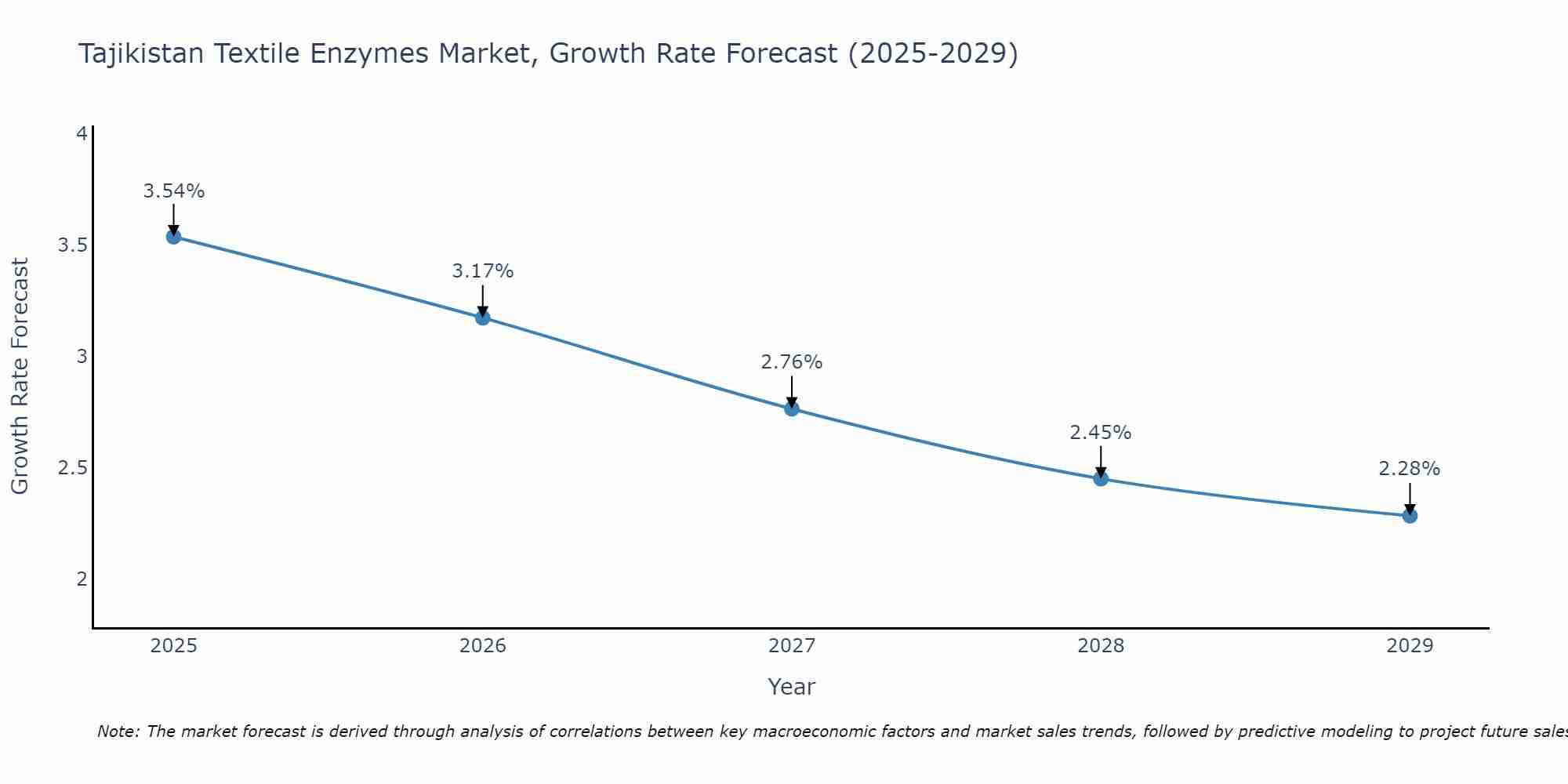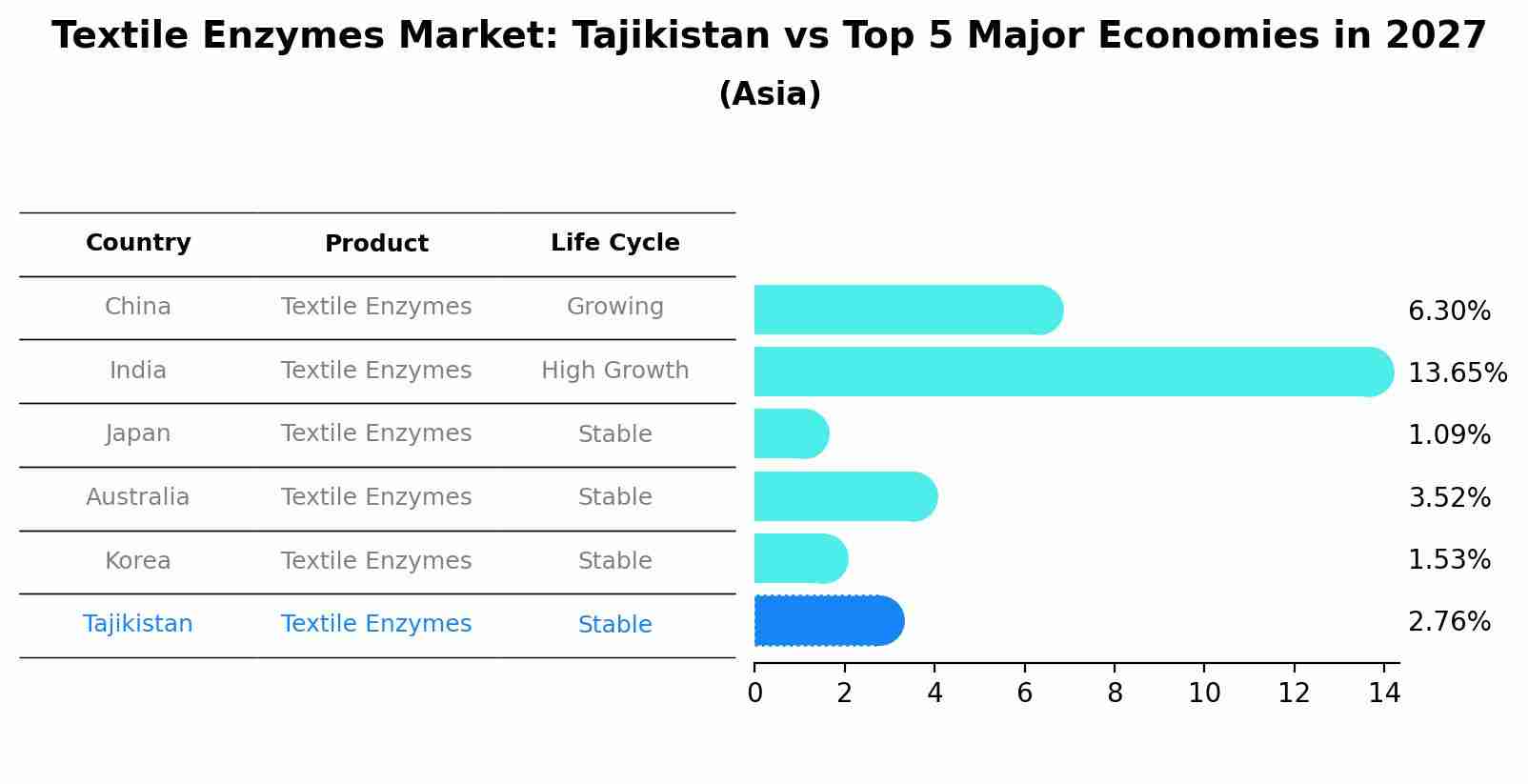Tajikistan Textile Enzymes Market (2025-2031) Outlook | Revenue, Forecast, Industry, Companies, Growth, Size, Share, Trends, Analysis & Value
| Product Code: ETC094098 | Publication Date: Jun 2021 | Updated Date: Jun 2025 | Product Type: Report | |
| Publisher: 6Wresearch | Author: Summon Dutta | No. of Pages: 70 | No. of Figures: 35 | No. of Tables: 5 |
Tajikistan Textile Enzymes Market Size Growth Rate
The Tajikistan Textile Enzymes Market could see a tapering of growth rates over 2025 to 2029. Starting high at 3.54% in 2025, the market steadily declines to 2.28% by 2029.

Textile Enzymes Market: Tajikistan vs Top 5 Major Economies in 2027 (Asia)
The Textile Enzymes market in Tajikistan is projected to grow at a stable growth rate of 2.76% by 2027, within the Asia region led by China, along with other countries like India, Japan, Australia and South Korea, collectively shaping a dynamic and evolving market environment driven by innovation and increasing adoption of emerging technologies.

Tajikistan Textile Enzymes Market Overview
The Tajikistan Textile Enzymes Market is experiencing steady growth driven by increasing demand for sustainable and eco-friendly textile processing solutions. Enzymes are being widely adopted in the textile industry in Tajikistan due to their ability to improve fabric quality, reduce water and energy consumption, and eliminate the need for harsh chemicals. Key players in the market are focusing on developing innovative enzyme solutions tailored to the specific needs of the Tajik textile industry, such as bio-polishing enzymes for cotton garments and cellulase enzymes for denim processing. The market is also witnessing a rise in partnerships and collaborations between local textile manufacturers and international enzyme suppliers to enhance product offerings and expand market reach. Overall, the Tajikistan Textile Enzymes Market is poised for further growth as the industry continues to prioritize sustainability and efficiency in textile processing.
Tajikistan Textile Enzymes Market Trends
The Tajikistan Textile Enzymes Market is witnessing a growing demand for eco-friendly and sustainable textile processing solutions. Enzymes are increasingly being used in textile production processes to reduce the environmental impact by minimizing water and energy consumption, as well as reducing the use of harsh chemicals. Additionally, there is a rising trend towards using enzymes for biofinishing applications to enhance the quality and performance of textiles. Companies in Tajikistan are focusing on developing innovative enzyme solutions tailored to the specific needs of the textile industry, such as improving fabric softness, color brightness, and overall product sustainability. This shift towards eco-friendly practices and sustainable textile processing is expected to drive further growth in the Tajikistan Textile Enzymes Market in the coming years.
Tajikistan Textile Enzymes Market Challenges
In the Tajikistan Textile Enzymes Market, some challenges faced include limited awareness and understanding of the benefits of using textile enzymes among manufacturers and consumers, as well as a lack of technological infrastructure for efficient enzyme application in textile production processes. Additionally, the industry may struggle with the availability of skilled labor trained in enzyme application techniques and the high cost associated with implementing enzyme-based solutions in textile manufacturing. Furthermore, the reliance on traditional methods and resistance to change within the industry pose barriers to the widespread adoption of textile enzymes. Overcoming these challenges would require targeted educational initiatives, investment in infrastructure, and fostering collaborations between technology providers and textile manufacturers to drive innovation and enhance the competitiveness of the Tajikistan Textile Enzymes Market.
Tajikistan Textile Enzymes Market Investment Opportunities
The Tajikistan Textile Enzymes Market presents promising investment opportunities due to the growing demand for eco-friendly and sustainable textile processing solutions. Enzymes are increasingly being used in the textile industry as they offer benefits such as reduced water and energy consumption, improved product quality, and environmental compliance. Investors can explore opportunities in supplying textile enzymes to local textile manufacturers, conducting research and development for new enzyme formulations tailored to the market`s needs, or partnering with existing players to expand their product offerings. With the textile industry in Tajikistan poised for growth and increasing awareness of sustainability practices, investing in the textile enzymes market could yield significant returns in the long run.
Tajikistan Textile Enzymes Market Government Policy
Government policies in Tajikistan related to the Textile Enzymes Market are aimed at promoting the growth and development of the textile industry. The government has implemented tariff policies to protect local textile manufacturers and encourage domestic production. Additionally, there are regulations in place to ensure the quality and safety of textile enzymes used in the manufacturing process. The government also provides incentives and support for research and development in the textile sector to improve efficiency and competitiveness. Overall, the government`s policies are focused on fostering a conducive environment for the growth of the Textile Enzymes Market in Tajikistan while safeguarding the interests of local producers and ensuring consumer protection.
Tajikistan Textile Enzymes Market Future Outlook
The future outlook for the Tajikistan Textile Enzymes Market appears promising, driven by the increasing demand for eco-friendly and sustainable textile processes. With a growing emphasis on reducing environmental impact in the textile industry, the adoption of textile enzymes is expected to rise steadily in Tajikistan. Enzymes offer advantages such as energy efficiency, reduced water consumption, and improved fabric quality, making them an attractive choice for textile manufacturers. Additionally, the government`s initiatives to promote sustainable practices in the textile sector are likely to further boost the market for textile enzymes in Tajikistan. Overall, the market is poised for growth as the industry shifts towards greener and more efficient production methods.
Key Highlights of the Report:
- Tajikistan Textile Enzymes Market Outlook
- Market Size of Tajikistan Textile Enzymes Market, 2021
- Forecast of Tajikistan Textile Enzymes Market, 2031
- Historical Data and Forecast of Tajikistan Textile Enzymes Revenues & Volume for the Period 2021 - 2031
- Tajikistan Textile Enzymes Market Trend Evolution
- Tajikistan Textile Enzymes Market Drivers and Challenges
- Tajikistan Textile Enzymes Price Trends
- Tajikistan Textile Enzymes Porter's Five Forces
- Tajikistan Textile Enzymes Industry Life Cycle
- Historical Data and Forecast of Tajikistan Textile Enzymes Market Revenues & Volume By Type for the Period 2021 - 2031
- Historical Data and Forecast of Tajikistan Textile Enzymes Market Revenues & Volume By Cellulase for the Period 2021 - 2031
- Historical Data and Forecast of Tajikistan Textile Enzymes Market Revenues & Volume By Amylase for the Period 2021 - 2031
- Historical Data and Forecast of Tajikistan Textile Enzymes Market Revenues & Volume By Catalase for the Period 2021 - 2031
- Historical Data and Forecast of Tajikistan Textile Enzymes Market Revenues & Volume By Pectinase for the Period 2021 - 2031
- Historical Data and Forecast of Tajikistan Textile Enzymes Market Revenues & Volume By Laccase for the Period 2021 - 2031
- Historical Data and Forecast of Tajikistan Textile Enzymes Market Revenues & Volume By Others for the Period 2021 - 2031
- Historical Data and Forecast of Tajikistan Textile Enzymes Market Revenues & Volume By Application for the Period 2021 - 2031
- Historical Data and Forecast of Tajikistan Textile Enzymes Market Revenues & Volume By Bio-polishing for the Period 2021 - 2031
- Historical Data and Forecast of Tajikistan Textile Enzymes Market Revenues & Volume By Desizing for the Period 2021 - 2031
- Historical Data and Forecast of Tajikistan Textile Enzymes Market Revenues & Volume By Enzymatic Bleaching for the Period 2021 - 2031
- Historical Data and Forecast of Tajikistan Textile Enzymes Market Revenues & Volume By Bioscouring for the Period 2021 - 2031
- Historical Data and Forecast of Tajikistan Textile Enzymes Market Revenues & Volume By Others for the Period 2021 - 2031
- Tajikistan Textile Enzymes Import Export Trade Statistics
- Market Opportunity Assessment By Type
- Market Opportunity Assessment By Application
- Tajikistan Textile Enzymes Top Companies Market Share
- Tajikistan Textile Enzymes Competitive Benchmarking By Technical and Operational Parameters
- Tajikistan Textile Enzymes Company Profiles
- Tajikistan Textile Enzymes Key Strategic Recommendations
Frequently Asked Questions About the Market Study (FAQs):
- Single User License$ 1,995
- Department License$ 2,400
- Site License$ 3,120
- Global License$ 3,795
Search
Thought Leadership and Analyst Meet
Our Clients
Related Reports
- Canada Oil and Gas Market (2026-2032) | Share, Segmentation, Value, Industry, Trends, Forecast, Analysis, Size & Revenue, Growth, Competitive Landscape, Outlook, Companies
- Germany Breakfast Food Market (2026-2032) | Industry, Share, Growth, Size, Companies, Value, Analysis, Revenue, Trends, Forecast & Outlook
- Australia Briquette Market (2025-2031) | Growth, Size, Revenue, Forecast, Analysis, Trends, Value, Share, Industry & Companies
- Vietnam System Integrator Market (2025-2031) | Size, Companies, Analysis, Industry, Value, Forecast, Growth, Trends, Revenue & Share
- ASEAN and Thailand Brain Health Supplements Market (2025-2031) | Strategy, Consumer Insights, Analysis, Investment Trends, Opportunities, Growth, Size, Share, Industry, Revenue, Segments, Value, Segmentation, Supply, Forecast, Restraints, Outlook, Competition, Drivers, Trends, Demand, Pricing Analysis, Competitive, Strategic Insights, Companies, Challenges
- ASEAN Bearings Market (2025-2031) | Strategy, Consumer Insights, Analysis, Investment Trends, Opportunities, Growth, Size, Share, Industry, Revenue, Segments, Value, Segmentation, Supply, Forecast, Restraints, Outlook, Competition, Drivers, Trends, Demand, Pricing Analysis, Competitive, Strategic Insights, Companies, Challenges
- Europe Flooring Market (2025-2031) | Outlook, Share, Industry, Trends, Forecast, Companies, Revenue, Size, Analysis, Growth & Value
- Saudi Arabia Manlift Market (2025-2031) | Outlook, Size, Growth, Trends, Companies, Industry, Revenue, Value, Share, Forecast & Analysis
- Uganda Excavator, Crane, and Wheel Loaders Market (2025-2031) | Strategy, Consumer Insights, Analysis, Investment Trends, Opportunities, Growth, Size, Share, Industry, Revenue, Segments, Value, Segmentation, Supply, Forecast, Restraints, Outlook, Competition, Drivers, Trends, Demand, Pricing Analysis, Competitive, Strategic Insights, Companies, Challenges
- Rwanda Excavator, Crane, and Wheel Loaders Market (2025-2031) | Strategy, Consumer Insights, Analysis, Investment Trends, Opportunities, Growth, Size, Share, Industry, Revenue, Segments, Value, Segmentation, Supply, Forecast, Restraints, Outlook, Competition, Drivers, Trends, Demand, Pricing Analysis, Competitive, Strategic Insights, Companies, Challenges
Industry Events and Analyst Meet
Whitepaper
- Middle East & Africa Commercial Security Market Click here to view more.
- Middle East & Africa Fire Safety Systems & Equipment Market Click here to view more.
- GCC Drone Market Click here to view more.
- Middle East Lighting Fixture Market Click here to view more.
- GCC Physical & Perimeter Security Market Click here to view more.
6WResearch In News
- Doha a strategic location for EV manufacturing hub: IPA Qatar
- Demand for luxury TVs surging in the GCC, says Samsung
- Empowering Growth: The Thriving Journey of Bangladesh’s Cable Industry
- Demand for luxury TVs surging in the GCC, says Samsung
- Video call with a traditional healer? Once unthinkable, it’s now common in South Africa
- Intelligent Buildings To Smooth GCC’s Path To Net Zero


















